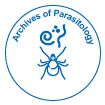Cysticercosis of the Spine: A Review
Received Date: Jun 02, 2017 / Accepted Date: Jul 20, 2017 / Published Date: Jul 25, 2017
Abstract
Cysticercosis, caused by the helminth Taenia solium, is the most common parasitic infection of the central nervous system in humans, most commonly involving the brain. Spinal involvement by the cysticerci is relatively rare. However, the disease is much more common in developing nations with poor sanitation standards, and is also increasingly being reported from developed nations with a high immigrant population. Human beings, being natural definitive hosts for T. solium, infection occurs when humans become the accidental intermediate host, either due to consumption of poorly cooked pork or consuming food contaminated with the parasitic eggs via faeco-oral route from a carrier. Spinal cysticercosis usually presents with progressive neurological deficit, myelopathy and often bladder incontinence. Considered a focal manifestation of systemic disease, cysticercosis is an essential differential diagnosis in case of compressive spinal lesions in endemic nations. Diagnosis is accurately established based on clinical assessment, imaging studies, especially MRI being the definitive test for cysticercal lesion, and immunodiagnostic serological tests. Treatment includes medical as well as surgical line of management. Medical treatment using cysticidal anti-helminthic drugs like albendazole and praziquantel, is indicated for stable solitary cysticercal spinal lesions and as a preoperative and postoperative prophylaxis to decrease the parasitic load and prevent recurrence, respectively. Surgical management is indicated in the presence of progressively worsening neurological deficit, when the diagnosis is in doubt and in presence of severe intramedullary or extramedullary spinal cord compression. The outcome of combined modality treatment is generally favourable.
Keywords: Cysticercosis; Spinal cord; Spinal; Taenia solium; Neurocysticercosis
Citation: Shah S, Dalvie S (2017) Cysticercosis of the Spine: A Review. Arch Parasitol 1:110.
Copyright: © 2017 Shah S, et al. This is an open-access article distributed under the terms of the Creative Commons Attribution License, which permits unrestricted use, distribution, and reproduction in any medium, provided the original author and source are credited.
